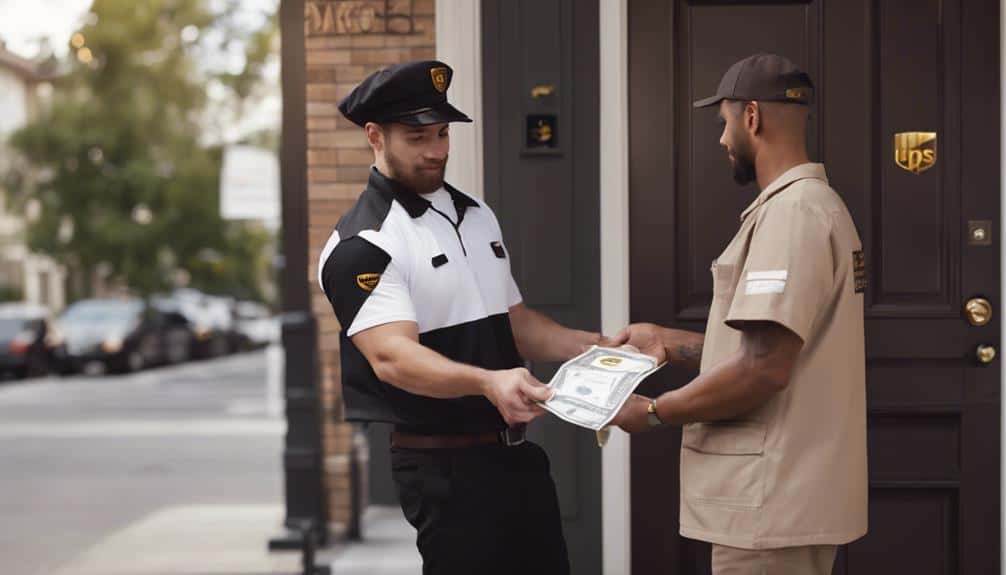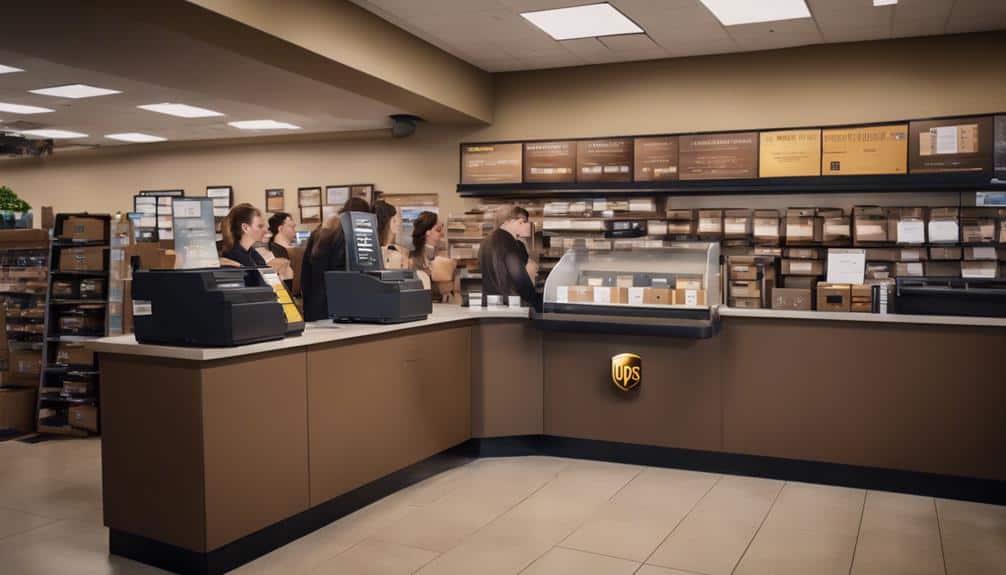UPS's stance on money orders is resolute: the company does not engage in selling or cashing money orders. This decision is in line with UPS's primary focus on logistics and shipping services, diverging from financial transactions. The infrastructure and authorization required to handle money orders do not align with UPS's operational priorities, citing inherent risks of theft and fraud that conflict with its business model. For those seeking more details on UPS's approach to money orders and alternatives available, further insights await in the detailed research provided, shedding light on the implications of their business model and cost-effective options in the market.
Key Takeaways
- UPS does not sell or cash money orders.
- Money order services conflict with UPS's logistics focus.
- Lack of authorization and infrastructure for money orders.
- Handling money orders poses theft and fraud risks.
Money Orders: An Overview

Money orders serve as a secure and convenient method for transferring funds without the need for cash or checks.
The history of money orders dates back to the 18th century, evolving to provide a safer alternative to cash payments.
Security features, such as recipient details and tracking capabilities, enhance the reliability of money orders, reducing the risk of fraud and theft.
This payment method has gained popularity due to its widespread acceptance at banks, post offices, and money transfer agents.
With the ability to cater to various financial needs, including payments to non-account holders and secure travel funds, money orders continue to be a trusted choice for individuals seeking a reliable and secure way to transfer money.
UPS's Stance on Money Orders
Regarding financial transactions, UPS has a clear stance on money orders in alignment with its core business operations.
UPS does not engage in the sale or cashing of money orders. This decision is rooted in the company's focus on logistics and shipping services, which do not encompass money order transactions.
UPS lacks the necessary authorization, infrastructure, and security measures required for handling money orders.
Money orders present inherent risks related to theft and fraud, making them incongruent with UPS's business model.
UPS's Business Model and Money Orders

Given UPS's strategic focus on logistics and shipping services, the absence of money order transactions aligns with the company's operational priorities and risk management strategies.
UPS's core business model revolves around efficient package delivery and supply chain management, which necessitates a streamlined operational approach.
Engaging in money order services would diverge from UPS's financial strategy, as these transactions typically involve low-profit margins and heightened risks of theft and fraud.
The infrastructure required for money order operations may not complement UPS's existing operations, potentially leading to increased costs without significant financial gain.
Money Order Alternatives
Amidst the limited money order services provided by certain entities, various alternative options exist for individuals seeking secure and convenient methods of transferring funds.
When considering cash alternatives and digital payment methods, the following options stand out:
- Banks and Credit Unions: Offering reliable money order services with low fees.
- Post Offices: Providing a wide network and generally low fees for money orders.
- Money Transfer Agents: Such as Western Union and MoneyGram specializing in money transfers, albeit at higher fees.
- Convenience Stores and Pharmacies: Though they may sell or cash money orders, fees can be comparatively higher.
These alternatives cater to diverse needs and preferences, ensuring flexibility and accessibility in financial transactions while mitigating the limitations of traditional money orders.
2023 Money Order Costs

Analyzing the costs associated with money orders in 2023 reveals varying fees based on factors such as the amount, provider, location, and type of money order.
For instance, USPS charges $1.25 for domestic orders up to $500 and $10.25 for international orders.
Western Union's fees amount to $1.50 for domestic orders up to $1,000, with differing fees for international orders.
MoneyGram imposes fees ranging from $1.25 to $1.65 for domestic orders, also varying for international transactions.
Kroger offers money orders at $0.65 for domestic orders with a loyalty card, while Walgreens charges $0.84 for orders up to $500.
Understanding these money order fees is essential for individuals seeking to make secure payments while considering cost-effectiveness and payment security.
Money Order Providers Comparison
Comparing money order providers reveals distinct fee structures and service offerings that cater to varying customer needs and preferences. When evaluating different providers, consider the following:
- Money Order History: Understanding the background and reliability of the provider in handling money orders is essential for secure transactions.
- International Money Orders: Check if the provider offers international money orders and compare the associated fees and exchange rates.
- Service Network: Assess the provider's network of locations for convenient access when sending or receiving money orders.
- Fee Structures: Analyze the fee schedules of various providers to determine the most cost-effective option for your specific needs.
Additional Resources for Money Orders

A thorough compilation of additional resources for money orders offers valuable insights into diverse service options and provider comparisons.
When considering money order security, banks and credit unions are reliable choices due to their stringent protocols and tracking capabilities.
Post offices, known for their wide network, also provide secure options for sending money orders.
Money transfer agents like Western Union and MoneyGram offer tracking services for added security, although fees may be higher.
It is crucial to prioritize safety and tracking features when selecting a money order provider to guarantee the secure transfer of funds.
Understanding the available resources and their respective security measures can help individuals make informed decisions when utilizing money orders for financial transactions.
Conclusion
To sum up, UPS's decision to abstain from money order services reflects a strategic focus on its core competencies in logistics and shipping.
While this stance may limit customer options for financial transactions, it underscores the company's commitment to efficiency and security in its operations.
As businesses continue to evolve and adapt to changing market dynamics, understanding the rationale behind such decisions provides valuable insights into the intricacies of corporate decision-making.

Oliver Postman was born and raised in a small town in the Midwest, where his fascination with postage began at an early age. At just six years old, he stumbled upon a box of old stamps in his grandfather’s attic, igniting a passion that would shape his life.

